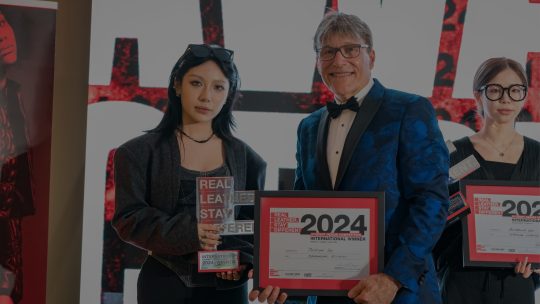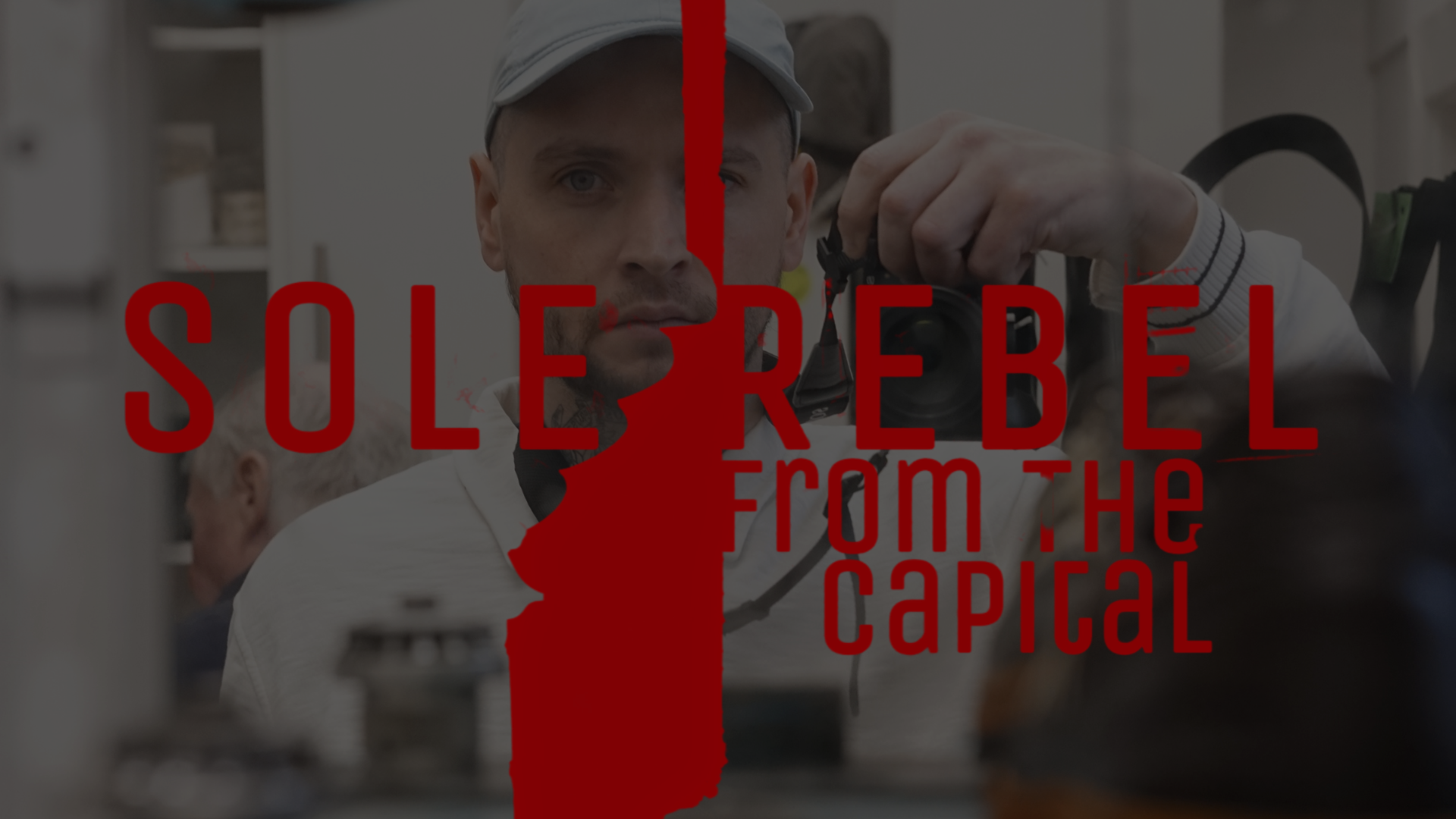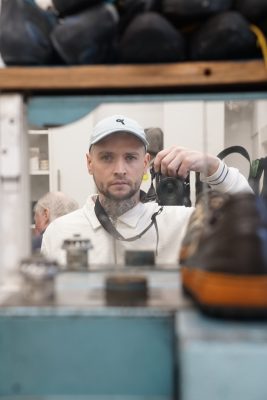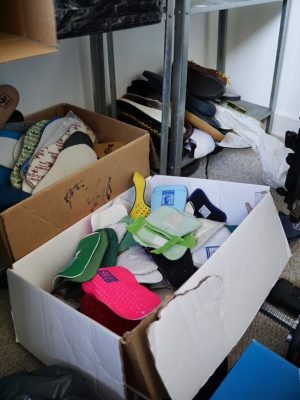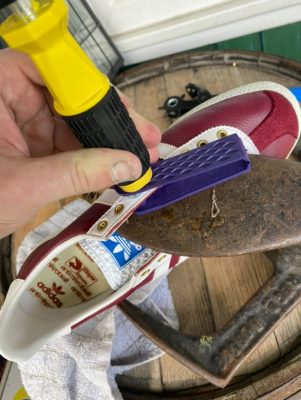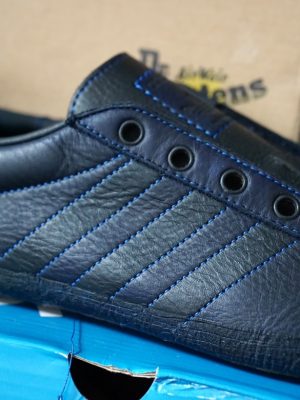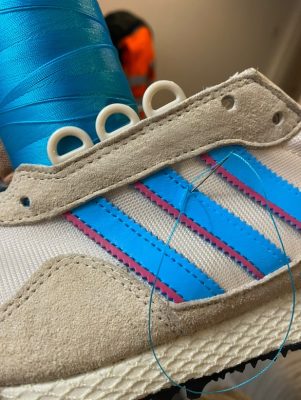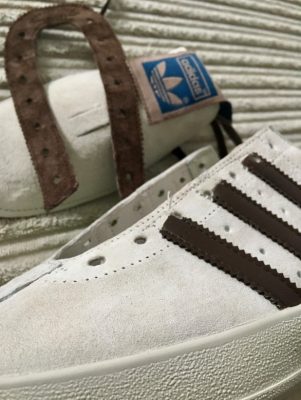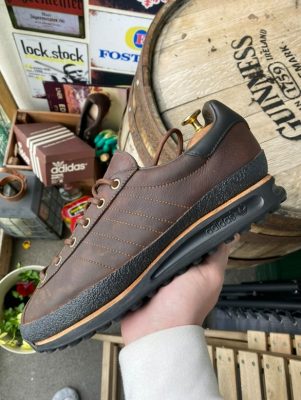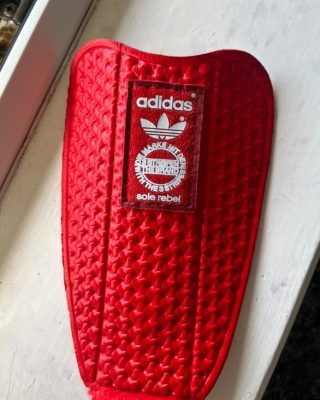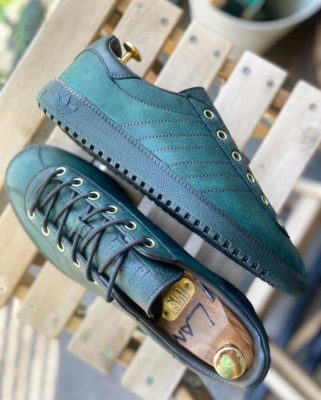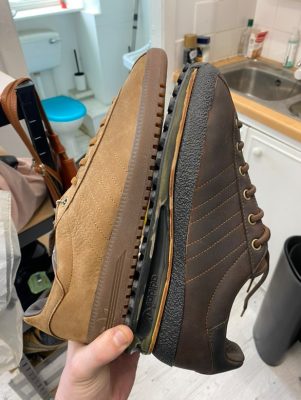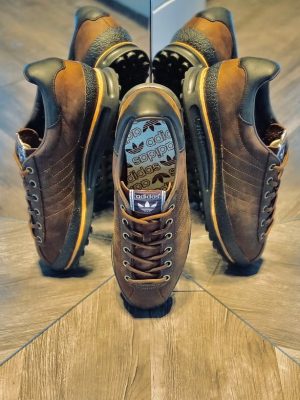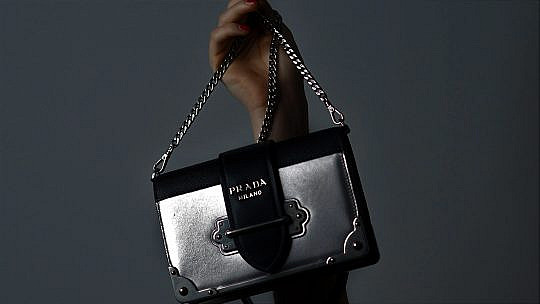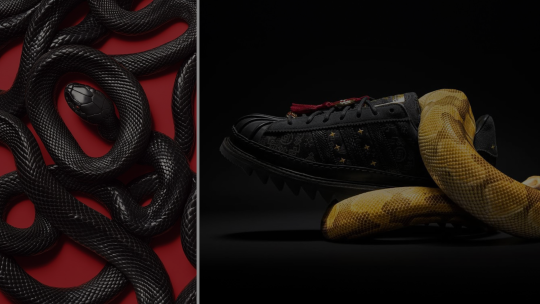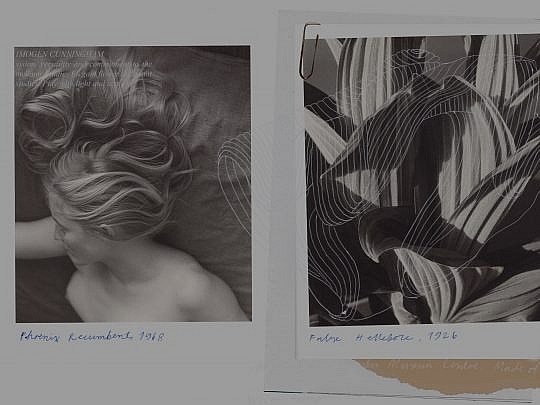In a world hyperfixated on what will be deemed the next big trend, Connor McKenzie is breaking the mould – taking items that are already available and reimagining them. Through his work under Sole Rebel, he customises sneakers with a unique, handcrafted approach, breathing new life into discarded materials. But for Connor, this work is not about chasing sustainability as a buzzword; it’s about instinct, creativity and respect for quality craftsmanship.
Based in Edinburgh, Connor is a one-man operation, working from what he jokingly describes as a “disorganised spare room.” A self-proclaimed hoarder, he collects scrap leather and old shoes, upcycling them into something fresh. From family influences to his experience working in waste-heavy industries, we spoke about what drives his work, what’s holding him back and what the future holds for Sole Rebel. Connor’s perspective has been shaped by his past and we loved diving into his vision for leather.
Finding purpose in craft
Before Sole Rebel, Connor worked in customer service at Amazon, supermarkets and as a bin man — jobs that exposed the sheer volume of waste that industries generate. He now credits these experiences for cementing his belief in craftsmanship over consumerism.
Connor’s deep-rooted appreciation for fashion and individuality started young. Growing up, he was surrounded by family members who embraced personal style as an extension of identity. Clothes weren’t just about practicality; they carried meaning, whether through nostalgia, quality, or a sense of belonging.
“I’m a product of the movements that championed and culturally cemented both brands – Adidas & Dr Martens in the UK originally. My mum is a Northern Soul DJ whilst my stepdad and his brothers were prominent Hibs casuals in the 80s and 90s.”
“These two subcultures are intertwined with 60s Mod and Skinheads, they all evolved from each other and it’s my obsession with them that really got me hooked on the fashion and music at a very early age.”
This early exposure to fashion as something intentional and expressive laid the groundwork for his future creative pursuits.
A natural approach to sustainability
Though sustainability isn’t a term Connor actively promotes, it’s deeply embedded in his work. He collects and stores leather scraps, trainer tongues and soles.
“I find more and more use for scrap materials as I expand my knowledge and skillset,” he explains. “I’ve had shoes sitting on my shelf for months before a piece of newly learned knowledge sparks a creative idea for them and the scraps scattered around my spare room. It’s great for experimentation and trying out new ideas.”
And when asked why he uses leather:
“Leather can last lifetimes if maintained properly; it doesn’t flake or disintegrate after 5-10 years,” Connor explains. “There’s a natural, almost rustic quality to leather that I can’t quite put my finger on. It feels very natural to work with, and it’s always a shame to see it go to waste.”
A turning point at langley’s
A key moment in Connor’s journey came when he started working at Langley’s, a specialist in leather restoration in Edinburgh. The experience refined his eye for quality and introduced him to essential techniques.
“Langley’s was definitely a turning point for me,” he reflects. “I still struggle with the terminology and I’m not an expert, but my eye for quality has drastically improved. I learned how to gauge the quality of leather and suedes, along with many different dyeing and restoring techniques.”
He directly accredits the knowledge he gained there as a central influence on his work today, particularly in his ability to assess materials and experiment with traditional techniques.
Challenging fast fashion’s disposable mindset
“Big companies just mass-produce and create variations of similar products when they notice a trend. They throw everything at it, knowing there will be a lot of waste along with astronomical profits.”
Connor’s love for fashion runs deep, but he’s critical of the industry’s obsession with mass production and fleeting trends. His views on fast fashion and consumerism have been shaped by years of observing how brands prioritise profit over quality—pushing out endless variations of the same products with little regard for waste. Instead, Connor champions a different approach: valuing what already exists and paying homage to the history of fashion and the subcultures that inspire him.
“I love products that are high in quality, limited to ensure that high standard, and preferably created by people who specialise in making what you’re buying,” he says.
His advice for those looking to shop or repair footwear more consciously? Learn how shoes are made. “Even just basic knowledge helps. A lot of techniques imitate good quality, but it’s all an illusion—and they have the cheek to charge inflated prices. Buy second-hand, seek out great restorers and cobblers. There’s always something that can be done to repurpose or restore your footwear.”
What’s next for Sole Rebel?
“I’ll never stop learning and making, but it’s unpredictable as a means of income. I don’t have the attention span to keep doing the same designs over and over for a profit. I just want to get my ideas out there and hopefully have them picked up by the brands I’d love to work with.”
Connor has an exciting lineup of custom projects in the works, including the Adidas New York ‘Auld Reekie’, an IRN BRU-themed pair and a design inspired by ADHD awareness. But while the ideas keep flowing, turning Sole Rebel into a sustainable business isn’t easy in today’s economic climate. “My plan is to get through as many of my ideas as possible before I have to go back to regular work,” he admits.
While we’d love to see more of Connor’s work out in the world, we understand why mass production isn’t on the cards—his approach is the opposite of fast fashion. With ADHD playing a part in the way he works, perhaps the right partnership could help push Sole Rebel forward. If not, we’ll just have to hope we can get our hands on one of his creations while we can.
What RLSD thinks
Our conversation with Connor about his approach to leatherwork and customisation was as refreshing as it was inspiring.
His work challenges the fast fashion mindset, proving that creativity and conscious design can go hand in hand. His regenerative process, driven by a love for quality craftsmanship and the instinct to repurpose, sets a powerful example for others in the industry. In a world constantly pushing for the new, Connor reminds us that there’s beauty in what already exists.
Read the full interview with Connor McKenzie, the creative force behind Sole Rebel, here.
Check out more of Connors work for yourself:
LinkedIn: Connor McKenzie
Instagram: @solerebel.edin
Facebook: Sole Rebel
